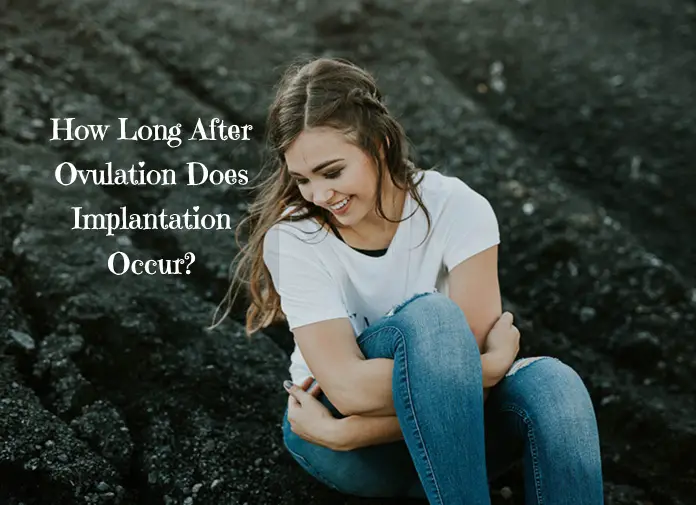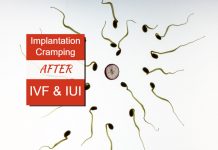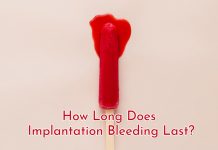How long after ovulation does implantation occur? Implantation occurs 7-9 DPO (Days Post Ovulation). Ovulation and conception occur within 24 hours as the egg is not viable after it. Cleavage of the single zygote to multi-celled blastocyst stage takes 5-8 days. It is the blastocyst that implants in the lining of the uterus for forming the baby.
Implantation occurs after seven days from ovulation or conception. We know it is not as easy to understand. You might have also read that implantation may occur between 7-12 days after ovulation. So how long after ovulation does implantation occur is still not clear! ????
But it is a fact that no one can tell you for sure that implantation will occur on this day after ovulation. Each person is different, and so is the new one forming inside you. We can’t predict when exactly implantation will happen in a natural pregnancy.
But in the case of treatments like IVF and IUI implantation occurs after 6-12 from ovulation. It is because the probability of delay in implantation reduces due to the artificial assistance.
Before we explain how long after ovulation does implantation occur, it’s necessary to understand a few things, so I will urge you to be a little patient… ????

Ovulation, Conception, Fertilization, and Implantation
Except for ovulation, this is the sequence of events after sex leading to pregnancy. When you have unprotected sex after ovulation, then you can get pregnant.
Conception is the act of getting pregnant. Fertilization is the event following delivery of sperms in the vagina. After sperms enter the vagina, they travel to the tubes and fertilization occurs.
Once fertilization is successful, the zygote is capable of dividing and traveling down to the uterus back. Now it implants in the lining of the uterus.
Implantation is the final step for the onset of pregnancy. If implantation is successful, then you are pregnant.
Implantation is the decisive turn point. Mother’s body recognizes the embryo as a foreign particle before implantation. After implantation, there is an analysis of the genetic content and for its defects. If there are any defects, then the mother’s body rejects the embryo and sends it for the period.
When does ovulation occur?
Ovulation is the release of an egg every month from either ovary. The secondary oocyte released from ovaries is not complete and cannot divide. When the sperm fuses with it, then the divisions begin.
Ovulation occurs when there is a surge of the LH hormone (Luteinizing Hormone) in your blood. This is usually the 14th day of the menstrual cycle. The egg stays viable for 24 hours after ovulation and can convert into a zygote.
When does fertilization take place?
Fertilization takes place after the sperm head fuses in the egg. This creates a cone of reception that transfers the genetic matter from the sperm to the egg.
After fertilization, the division of egg begins. Fertilization occurs within 24 hours after ovulation. If it does not happen during that time, then the egg passes for coming out as menstrual flow when the period arrives.
Sperms can stay in the vagina for five days. So if you have sex three days before ovulation till the day of ovulation, you can get pregnant.
How Long After Ovulation Does Implantation Occur?
Implantation occurs after 7-12 days from ovulation. It is because after ovulation conception takes 24 hours. Later on, the egg needs time to prepare for the first division. It takes three days for the egg to divide three times.
Implantation occurs only after the formation of the 64 celled structure called blastocyst. Later on, another 48 hours are required for the egg to attach to the wall of the uterus and sink in the layers of the endometrium. Implantation takes a week after conception.
Conception and fertilization are overlapping terms. Ovulation and fertilization don’t have a huge time lag. So as only after few hours from ovulation, fertilization occurs one can say that implantation takes a week after fertilization.
The critical day of implantation is the seventh day. And completion of implantation occurs on the eighth day after fertilization.
HOW LONG AFTER OVULATION DOES IMPLANTATION OCCUR? IMPLANTATION OCCURS AFTER 7-12 DAYS FROM OVULATION.
Symptoms of Implantation
Pregnancy is the result of implantation more than of unprotected sex. Symptoms of implantation confirm that you are pregnant. However, these signs are not known by many women. There are major five symptoms of implantation:
1) Pregnancy toxicosis
The term early pregnancy toxicosis is the right way to describe morning sickness. The chemicals that release during fetal development can lead to toxicosis of the mother. Pregnancy toxicosis manifests itself as morning sickness.
Women complain of poor health, headache, and vomiting. This can be in the later stages of pregnancy as well. After implantation, symptoms of early pregnancy such as toxicosis by factors released are common.
2) Progesterone levels rise
As soon as implantation occurs the placenta formation begins, and the hCG hormone starts doubling. This hormone regulates all pregnancy hormones. Progesterone is the pregnancy hormone and is essential for continuing pregnancy.
The rising levels of progesterone prevent menstruation. Eventually, you’ll get a pregnancy glow because of progesterone that will also count as an implantation sign.
3) Implantation bleeding
The rare externally visible symptoms of implantation include implantation bleeding. The bloody discharge is because of the blood vessels compressing due to the blastocyst. The color of implantation spotting is brown or pink. You might feel slightly weak during this stage.
4) Implantation cramps
As the egg embedment occurs, it creates a pulling sensation in the lower stomach. The tingling and cramping sensations are implantation cramps.
5) Increase in cervical mucus
After implantation, the cervical mucus increases so that the mucus plug can form. If you have a lot of wetness in the area, then you know that you had implantation.




![Implantation Bleeding With Twins [How long does IB last with twins?] Implantation Bleeding With Twins](https://www.pregnanteve.com/wp-content/uploads/2019/01/implantation-bleeding-with-twins-218x150.jpg)




